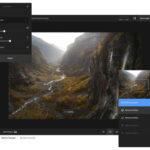Sure, you’ve heard the arguments in favor of new mirrorless cameras—they’re smaller and ultra-fast, offer tilt- or touch-screens, are built solidly dust-proof or with stronger sensors. But they’re not perfect, and DigitalRev TV is here to prove it to you. Check it out:
To summarize, here are the six reasons they point to:
- Battery life on mirrorless cameras is notoriously awful. For every 1,000 shots a standard DSLR can manage, Kai from DigitalRev estimates that the the Panasonic DMC-GH4 can take 500 shots, while the Sony A7R2 and Olympus OM-D series offer around 300 shots apiece.
- The autofocus sucks. The video doesn’t go into much detail on this subject, but DSLRs use their mirrors to create phase detection—dividing light into pairs of images and comparing them. Mirrorless cameras use what’s called contrast detection, which measures the contrast between pixels. This process is slower, worse at finding movement and weaker in low light.
- Image quality breaks down at ISO 3200. The DigitalRev team doesn’t go into much detail about this, and in fact the Sony A7R2 is known for being a strong contender in this department, but the majority of mirrorless camera still suffer from low-light noise and focus issues.
- The size difference isn’t as significant as you might think. Put a hefty lens on any camera, and you’re going to feel the weight. The cameras themselves, too, are getting bigger than they were when the first models were released.
- Lens choices are more limited than you think. Sure, you think the selection is huge, but budgets ultimately wind up limiting what you can afford.
- Electronic viewfinders are problematic. For one thing, you can’t see through them when the camera’s off—but keeping them on saps the battery. Optical viewfinders are also known to be clearer and offer a stronger dynamic range.
Some of these points are stronger than others, and the debate, of course, is ongoing. Ultimately, the question boils down to whether you—the reader—are convinced. Let us know in the comments below where you stand.
Like This Article?
Don't Miss The Next One!
Join over 100,000 photographers of all experience levels who receive our free photography tips and articles to stay current:








Hie, so much publicity about mirrorless, i have made my own research as a beginner…
Still several problems with mirrorless
-banding
-rolling shutter
-shutter shock
-dust on the sensor
Mirrorless may be the future but what about… now?
Good review. There’s a lot of hype about mirrorless being the way of the future even though DSLR’s continue to best them in performance and sales. After 10 years of mirrorless cameras the best of them is still only almost as good as a DSLR. The fact is that one month from now or one year from now DSLR’s will continue to be the favorite. That much is assured. Any further into the future is just guesswork. So if you really want to go with the type of camera that’s going to be the best for the foreseeable future you’ll choose the DSLR.
I use a lot sony alpha99 and 7r, and they are increadible, at the beginning, I get a hard time to understand mirrorless use and autofocus system, its a new way to work and shooting, now, any DSLR can win, please visit my work on http://www.chicoaudi.com
While there are none in the wild yet, the first indications regarding the new Fuji X Pro-2 seem to be pretty good in many areas this article tries to point out as weaknesses. The points made above might have had more “teeth” several years ago, but I think the mirrorless market is catching up to the DSLRs. Autofocus is NOT as good as DSLR, but it has certainly gotten much better for all but the most demanding events (IMHO).
I usually like your comments, but this “review” is a bunch of pure BS. The Sony a7Rii is simply the best camera I’ve ever owned. Let’s go through the writer’s points one by one.
* The batteries are small; throwing an extra one in my pocket is no big deal. And the number of images per battery is a function of how you use them. I shot a 90-minute rugby match last weekend on one battery – 850 images with 10% battery left at the end.
* I shoot wildlife and sports. Using the same rugby match as an example: virtually all of my action images were crystal clear with fast autofocus. As fast as any of my previous cameras (I’m with the media, so depend on fast AF.
* High ISO breaks down? Seriously? This camera beats anything I’ve used. Did you bother to check the reviews and testing?
* Size difference? Lenses on any camera add weight. But my back appreciates not having yet another 2 lbs in the body to lug around.
* Lens selection. If you’re planning to switch from another lens family, yes, plan on selling/buying new lenses. However, if you’re like me, you buy the small adapter and use it for your existing specialty uses (macro, ultra-wide).
* EVF. I would never, repeat NEVER, go back to an optical view finder. The EVF has so many advantages over optical that this becomes only a personal choice for those who are wedded to the past.
Perhaps the author should actually use a mirrorless camera for a while before writing what he obviously doesn’t know much about.
It (the article) might be all biased.
But we all need to do a reality check.
What you brought up as an example is not universal conditions. And it all ALWAYS depends on WHAT you are shooting and for which purpose.
Maybe (just maybe) your rugby game was brightly lit. Maybe (again, maybe) you didn’t care about picture composition. Maybe (same maybe) you could anticipate next move of a player and such.
Maybe if you carry 50 batteries and as strong as Mr. Schwarzenegger it’s fine. But changing the battery takes time. Along w/camera startup it will eat precious seconds.
Also contrast detect won’t work as fast as phase detect ever. Especially in low light.
My personal feeling towards mirrorless only covers single aspect: NEVER EVER the image you are seeing (neither in the EVF or on the display) will show you THE CURRENT MOMENT period. The image processing software+hardware will not allow you to see THIS INSTANT which you want to shoot. EVER.
Now… If you don’t care about your eyesight as much as I do (only now, sigh) the bright light of the screen so close to your retina won’t do you too much good (while still having a delay in showing the actual world out there).
I’m not sure if there are any studies considering effect of EVF on your eyesight and not sure if they will even be conducted (since it’s pretty difficult).
But I don’t like the idea of EVF. Because I DID have experience w/it (w/my first Coolpix 5700). Nah… I would NEVER go back to EVF.
Apparently Sony must be lying about their autofocus speed since your point #2 says “Autofocus sucks”, well, finding focus in 0.05 seconds doesn’t sound like “sucks” to me. Of course that’s with their new a6300 which they’re billing as the “worlds fastest autofocus” which if my budget wasn’t quite so cash challenged would be in my bag. I think it’s a pretty fast focus that I would be very happy with. And your point talking about lens choices being limited, as I understand it with the adapter Sony will accept just about any lens you want to hang on it.